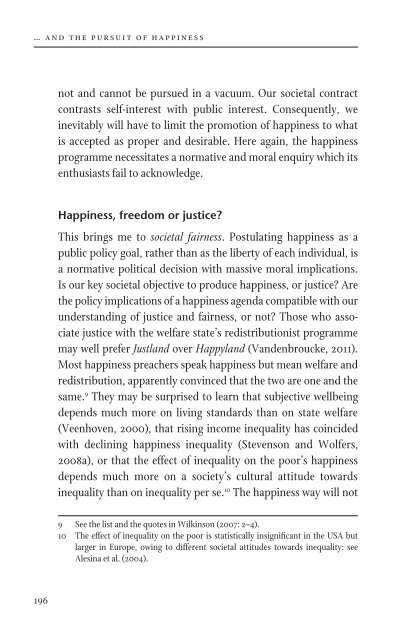… and the Pursuit of Happiness - Institute of Economic Affairs
… and the Pursuit of Happiness - Institute of Economic Affairs
… and the Pursuit of Happiness - Institute of Economic Affairs
Create successful ePaper yourself
Turn your PDF publications into a flip-book with our unique Google optimized e-Paper software.
<strong>…</strong> <strong>and</strong> <strong>the</strong> pursuit <strong>of</strong> happiness<br />
<strong>the</strong> unbearable lightness <strong>of</strong> happiness policy<br />
not <strong>and</strong> cannot be pursued in a vacuum. Our societal contract<br />
contrasts self-interest with public interest. Consequently, we<br />
inevitably will have to limit <strong>the</strong> promotion <strong>of</strong> happiness to what<br />
is accepted as proper <strong>and</strong> desirable. Here again, <strong>the</strong> happiness<br />
programme necessitates a normative <strong>and</strong> moral enquiry which its<br />
enthusiasts fail to acknowledge.<br />
<strong>Happiness</strong>, freedom or justice?<br />
This brings me to societal fairness. Postulating happiness as a<br />
public policy goal, ra<strong>the</strong>r than as <strong>the</strong> liberty <strong>of</strong> each individual, is<br />
a normative political decision with massive moral implications.<br />
Is our key societal objective to produce happiness, or justice? Are<br />
<strong>the</strong> policy implications <strong>of</strong> a happiness agenda compatible with our<br />
underst<strong>and</strong>ing <strong>of</strong> justice <strong>and</strong> fairness, or not? Those who associate<br />
justice with <strong>the</strong> welfare state’s redistributionist programme<br />
may well prefer Justl<strong>and</strong> over Happyl<strong>and</strong> (V<strong>and</strong>enbroucke, 2011).<br />
Most happiness preachers speak happiness but mean welfare <strong>and</strong><br />
redistribution, apparently convinced that <strong>the</strong> two are one <strong>and</strong> <strong>the</strong><br />
same. 9 They may be surprised to learn that subjective wellbeing<br />
depends much more on living st<strong>and</strong>ards than on state welfare<br />
(Veenhoven, 2000), that rising income inequality has coincided<br />
with declining happiness inequality (Stevenson <strong>and</strong> Wolfers,<br />
2008a), or that <strong>the</strong> effect <strong>of</strong> inequality on <strong>the</strong> poor’s happiness<br />
depends much more on a society’s cultural attitude towards<br />
inequality than on inequality per se. 10 The happiness way will not<br />
9 See <strong>the</strong> list <strong>and</strong> <strong>the</strong> quotes in Wilkinson (2007: 2–4).<br />
10 The effect <strong>of</strong> inequality on <strong>the</strong> poor is statistically insignificant in <strong>the</strong> USA but<br />
larger in Europe, owing to different societal attitudes towards inequality: see<br />
Alesina et al. (2004).<br />
necessarily be <strong>the</strong> path <strong>of</strong> egalitarianism <strong>and</strong> income redistribution<br />
so typically favoured by <strong>the</strong> missionaries <strong>of</strong> <strong>the</strong> welfare state.<br />
Indeed, <strong>the</strong> basic assumption that wealth does not bring everlasting<br />
happiness instead suggests that happiness policies will<br />
be less materialistic in emphasis. Choices will undoubtedly have<br />
to be made. The more conservative or libertarian minded will be<br />
quick to point out that more happiness is also closely related to<br />
more economic <strong>and</strong> political freedom, <strong>and</strong> that <strong>the</strong> opportunity<br />
for merited success beats any welfare programme on <strong>the</strong> happiness<br />
scale (Wilkinson, 2007: ch. 3).<br />
The moral case for a deliberate happiness agenda is <strong>the</strong>refore<br />
clearly far from straightforward. Any happiness policy – no matter<br />
how shaky or solid its statistics, no matter how sound or foolish its<br />
economics – will face a difficult moral trade-<strong>of</strong>f currently ignored<br />
by <strong>the</strong> swelling chorus <strong>of</strong> happiness adepts. Much <strong>of</strong> <strong>the</strong> current<br />
happiness tale is told in an amoral virtual reality shaped by <strong>the</strong><br />
factual registration <strong>of</strong> personal sentiments. It needs a healthy dose<br />
<strong>of</strong> ethical <strong>and</strong> philosophical reflection to set its moral bearings if we<br />
are to translate empirical findings into policy arguments. There will<br />
always be two sides to <strong>the</strong> morality coin, <strong>and</strong> no happiness policy<br />
can <strong>the</strong>refore be conceived as a straightforward ethical enterprise.<br />
More fundamentally, however, no matter how clever or<br />
balanced our construction <strong>of</strong> happiness may be, we cannot<br />
escape <strong>the</strong> fact that it will fail to capture a wide range <strong>of</strong> values<br />
<strong>and</strong> dimensions that people legitimately care about. If life is<br />
about much more than money, as most <strong>of</strong> us will readily admit,<br />
it is clearly also about much more than mere personal happiness.<br />
Any happiness policy by definition succumbs to an egotistic selfindulgent<br />
bias that ignores o<strong>the</strong>r fundamentals <strong>of</strong> <strong>the</strong> human<br />
condition, not only on <strong>the</strong> personal level but also in <strong>the</strong> context<br />
196 197












